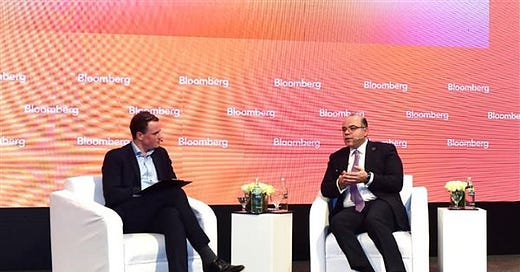Egypt's FRA Details Reforms to Boost Market Growth & Entrepreneurship
Egypt's Financial Regulatory Authority (FRA) is actively developing and implementing a suite of reforms aimed at enhancing the country's non-bank financial markets, facilitating corporate financing and expansion, and supporting entrepreneurship, according to FRA Chairman Dr. Mohamed Farid. Speaking at a Bloomberg Discovery conference, Dr. Farid outlined key initiatives focused on modernizing listing rules, embracing fintech, and promoting sustainable finance.
Modernizing Listing Rules for Growth & Entrepreneurship
The FRA is continuously refining the listing rules on the Egyptian Exchange (EGX) to encourage more companies to list and access funding. A key focus has been supporting startups and entrepreneurship through innovative financing solutions:
SPAC Regulations: The FRA has organized rules for Special Purpose Acquisition Companies (SPACs) to enable startups to access capital via the stock market. This included introducing flexible provisions, allowing M&A via share swaps or credit balances (in addition to cash), and permitting trading of SPAC shares both pre-acquisition (at subscription price) and post-acquisition for the public.
First Mover: These reforms resulted in the listing of Egypt's first venture capital-backed SPAC, which initially listed with EGP 10 million and subsequently raised its capital to EGP 235 million from qualified investors.
Dr. Farid highlighted SPACs as an unconventional financing solution aimed at empowering entrepreneurs.
Embracing Fintech & Digital Transformation
Technology is a core pillar of the FRA's development strategy. Key legislative and regulatory frameworks (Law No. 5 of 2022; FRA decisions 139-141 of 2023) have paved the way for digital transformation in non-bank financial services:
Fintech Outsourcing Registry: 4 companies are now registered providers, serving 84 NBFIs; 3 more are finalizing registration.
New Fintech NBFIs: 4 fintech startups have been approved to operate in the NBFI space; 7 more applications are under review.
Digital Transition: 14 existing NBFI companies have applied to offer their services digitally.
Expanding Investment Horizons & Sustainable Finance
The FRA has also updated investment regulations and promoted sustainable finance:
Insurance & Pension Fund Investments: Amended rules allow these institutions to invest in a more diverse range of assets for the first time, including metal ETFs, open-ended equity funds, and VC/PE funds, with specific allocation requirements mandated for certain asset classes.
Voluntary Carbon Market: Egypt launched the region's first regulated Voluntary Carbon Market, with ~28 emission reduction projects registered (from Egypt, India, Oman, Bangladesh) and 170,000 certificates in the database, 5,000 of which have already been traded.
ESG & Climate Reporting: Egypt is a regional leader with mandatory ESG reporting frameworks (FRA Decisions 107 & 108 of 2021) for larger NBFIs and all EGX-listed companies, including climate-related disclosures (TCFD).
Upcoming: Crowdfunding Regulations
Dr. Farid indicated that the FRA is close to finalizing regulations for participatory finance (crowdfunding) platforms focused on real estate funds and equity investments. This follows stakeholder consultations and aims to provide a regulated framework for this growing investment appetite among individuals.
Looking Ahead
The FRA's multi-pronged approach, combining regulatory modernization (SPACs, crowdfunding), fintech enablement, sustainable finance initiatives (carbon market, ESG), and updated investment rules, signals a clear strategy to deepen Egypt's non-bank financial sector. These reforms aim to create a more dynamic, inclusive, and resilient market capable of supporting corporate growth, fostering entrepreneurship, and contributing effectively to Egypt's Vision 2030 goals. The emphasis on technology and human capital development is crucial for ensuring the long-term impact of these changes.
Source: Banker News




